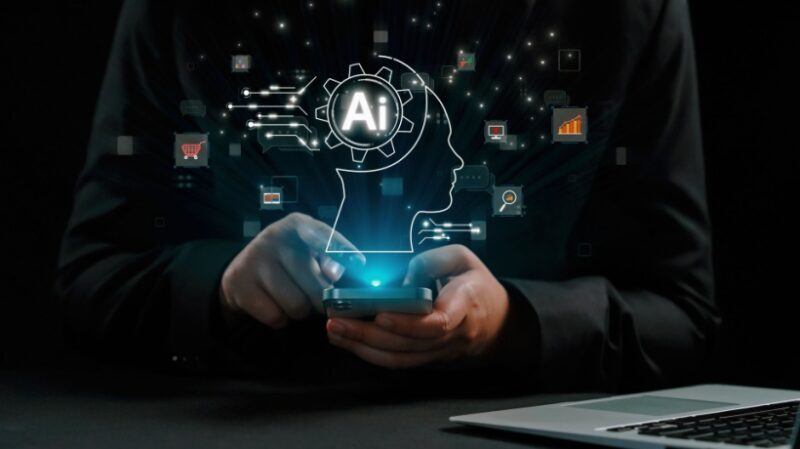
AI Is Revolutionizing Employee Training
In the modern workplace, rapid technological advancements continue to reshape traditional business practices. Among these innovations, Artificial Intelligence (AI) is increasingly becoming a pivotal tool, particularly in employee training programs. AI based employee training has transformed the way organizations educate and develop their workforce, offering unparalleled advantages in terms of efficiency, personalization, and engagement. As businesses strive to stay competitive in a global market, leveraging AI technology to enhance training processes is no longer a futuristic concept but a present-day necessity.
The Evolution Of Employee Training
Historically, employee training involved standardized methods such as classroom instruction, group workshops, or off-site seminars. These traditional methods, while effective to a certain extent, often failed to account for the varying learning paces, preferences, and needs of individual employees. Furthermore, the logistical challenges associated with organizing such programs—scheduling, resource allocation, and location—frequently led to inefficiencies.
The integration of AI into employee training heralds a new era, one that not only addresses the inefficiencies of conventional methods but also introduces innovative approaches that cater to the evolving demands of the modern workforce. According to a report by Gartner, “By 2025, 75% of businesses worldwide will have implemented AI-driven solutions in their employee development programs.” This underscores the growing importance of AI in enhancing training processes.
Efficiency: Streamlining Training Processes
AI-based employee training systems provide remarkable improvements in efficiency. Traditional training programs often require significant investments of time and resources, with limited flexibility to adapt to changing business needs. AI, however, streamlines these processes by automating time-consuming tasks, such as onboarding, assessment, and content delivery.
For instance, AI-powered tools can automatically generate and update training materials based on the latest industry trends and regulations. These tools also enable organizations to easily track employees’ progress, identify skill gaps, and adjust training schedules in real time. This level of automation allows companies to optimize training timelines, ensuring that employees receive the necessary information exactly when they need it, without unnecessary delays.
Furthermore, AI’s predictive analytics can assess which employees require additional training and which ones are excelling, allowing managers to allocate resources more effectively. According to a study by the McKinsey Global Institute, “AI has the potential to automate up to 50% of repetitive tasks in corporate training environments, significantly reducing the overall time spent on manual processes.”
Personalization: Tailored Learning Experiences
One of the most profound impacts of AI on employee training is the ability to deliver highly personalized learning experiences. Unlike traditional, one-size-fits-all training methods, AI-based employee training systems use Machine Learning algorithms to analyze individual learning patterns, preferences, and performance. This data-driven approach enables AI to create custom-tailored content that addresses the specific needs of each employee.
Personalization is a critical factor in fostering effective learning, as it allows employees to engage with content that is directly relevant to their roles and skill levels. AI systems can recommend specific modules, courses, or resources based on an employee’s previous performance or career objectives. This level of customization not only enhances the learning experience but also improves knowledge retention and the application of new skills in the workplace.
For example, an employee in a sales position might receive AI-generated training modules that focus on advanced negotiation techniques or customer relationship management, while a colleague in IT might be guided through content on the latest cybersecurity practices. This ability to deliver personalized learning experiences empowers employees to take ownership of their professional development and fosters a culture of continuous learning.
As reported by Infopro Learning, “AI-powered personalization can improve employee engagement by up to 60%, making the training process more dynamic and effective.” Such metrics highlight the direct correlation between personalized training and increased employee engagement and performance.
Engagement: Keeping Learners Invested
Engagement is a cornerstone of effective employee training, and AI-based solutions have proven to be highly effective in keeping learners invested. Traditional training programs often struggle to maintain interest and motivation, particularly when content is presented in a static, one-dimensional format. AI addresses this challenge by incorporating interactive elements, such as gamification, simulations, and real-time feedback, into the learning experience.
AI-driven training platforms can include dynamic quizzes, scenario-based exercises, and virtual environments where employees can practice real-world applications of their skills in a risk-free setting. These interactive features not only make the training process more enjoyable but also reinforce critical concepts through hands-on practice.
Moreover, AI can provide instant feedback to learners, offering real-time insights into their progress and areas for improvement. This immediate feedback loop helps employees stay engaged with the training process and enables them to correct mistakes or misunderstandings before they become ingrained. By offering tailored support and encouragement, AI ensures that learners remain motivated to achieve their training goals.
In a survey conducted by PwC, it was revealed that “72% of employees believe that AI-driven training tools are more engaging than traditional methods.” The growing reliance on interactive, adaptive training methods underscores the value of AI in fostering higher levels of learner engagement and satisfaction.
Cost-Effectiveness And Scalability
Beyond the obvious benefits of efficiency, personalization, and engagement, AI-based employee training also offers a substantial advantage in terms of cost-effectiveness and scalability. Traditional training programs often require significant financial outlays, particularly when factoring in travel, accommodation, and the need for physical infrastructure. AI eliminates many of these costs by enabling remote, digital learning experiences that can be accessed from anywhere, at any time.
Additionally, AI-based systems are highly scalable, making it possible for organizations to deliver consistent training to a global workforce without incurring additional costs. Whether a company is training 10 employees or 10,000, AI-powered platforms can handle the load with ease, ensuring that every employee receives the same high-quality training experience. This scalability is particularly beneficial for multinational organizations that need to deliver consistent training across diverse geographic locations.
According to Deloitte, “Companies that implement AI-driven learning systems can reduce their overall training costs by up to 35% while simultaneously improving training outcomes.” This ability to deliver high-quality, cost-effective training at scale is one of the key reasons why AI is quickly becoming an indispensable tool in employee development programs.
The Future Of AI-Based Employee Training
As AI technology continues to evolve, its applications in employee training will undoubtedly expand, further enhancing the ways in which organizations educate and develop their workforce. One emerging trend is the use of AI-driven Virtual Reality (VR) and Augmented Reality (AR) to create immersive training experiences that replicate real-world scenarios. These technologies enable employees to practice complex tasks in a controlled, simulated environment, offering a safe space for learning and experimentation.
Another promising development is the integration of AI with Learning Management Systems (LMSs) to create seamless, end-to-end training solutions. These AI-enhanced LMS platforms can offer continuous learning opportunities, track employee progress, and provide detailed analytics on the effectiveness of training programs. This level of integration ensures that employee training becomes a dynamic, ongoing process rather than a one-time event.
As AI continues to transform employee training, companies that fail to embrace these technologies risk falling behind in an increasingly competitive marketplace. In the words of Josh Bersin, a global HR thought leader, “AI is not just an enhancement to training programs—it is the future of workforce development.”
Conclusion
AI is revolutionizing employee training by offering unprecedented levels of efficiency, personalization, and engagement. By automating time-consuming tasks, delivering tailored learning experiences, and keeping learners engaged with interactive content, AI-based employee training systems provide a powerful solution to the challenges of traditional training methods. As companies seek to optimize their workforce development strategies, adopting AI-powered tools will be critical to ensuring long-term success.
In summary, AI-based employee training represents the future of workforce development, providing scalable, cost-effective solutions that meet the needs of a dynamic and increasingly digital workplace. The integration of AI into training programs not only enhances learning outcomes but also empowers employees to take ownership of their professional growth, driving both individual and organizational success.

